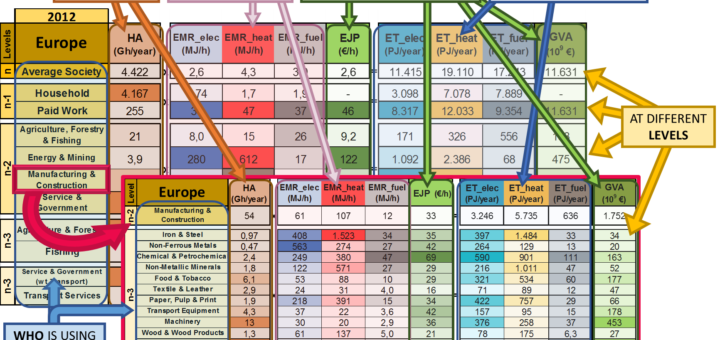Researchers take a critical look at the use of energy efficiency indicators in energy policy and state the strategy of energy efficiency to save energy is very simple. However, efficiency is problematic to implement. Oversimplification of efficiency measurements can have a detrimental effect on the choice of energy policies. Proposed method unpacks and structures energy input and output information in a meaningful and transparent way by generating a rich multi-level and multi-dimensional information space.
In this new publication, MAGIC researchers Raúl Velasco, Tessa Dunlop and Mario Giampietro take a critical look at the use of energy efficiency indicators in energy policy. They point out that the strategy of energy efficiency to save energy is deceptively simple: the idea is to use less input for the highest amount of useful output. However, on a practical and conceptual level, efficiency is an ambiguous and problematic concept to implement. Of particular concern is the lack of contextual and qualitative information provided in energy efficiency measurements based on simple ratios. Oversimplification of efficiency measurements can have a detrimental effect on the choice of energy policies. Efficiency measurements are particularly problematic on a macroeconomic scale where a significant amount of meaningful information is lost through the aggregation of data into a simple ratio (economic energy intensity).
The authors first present practical examples flagging conceptual problems with energy efficiency indicators, and then illustrate an alternative accounting method—the end-use matrix—based on the concept of the metabolic pattern of social-ecological systems to show the possibility of enriching efficiency indicators by adding qualitative and contextual information across multiple scales and dimensions. The proposed method unpacks and structures salient energy input and output information in a meaningful and transparent way by generating a rich multi-level and multi-dimensional information space.
To find out more, read the full paper in Energy Policy (open access) here. To learn more about MAGIC’s research on energy policy, check out our project website: https://magic-nexus.eu/policy-case-studies.
MAGIC
 MAGIC’s objective is to open the path towards a new way of managing the Nexus in which researchers and decision makers work together in the search for development strategies that can contribute to the smart, sustainable and inclusive economic growth required by the EU 2020 Strategy, while maintaining a leading and informed participation in international discussions about global issues, like climate change or food security.
In order to do so, MAGIC deploys a set of novel, cutting-edge and system-oriented approaches that originates from system ecology, bio-economics and Science and Technology Studies. Their combination allows MAGIC to highlights if a certain mix of EU policies results in undesirable or unforeseen outcomes. Climate, water, land energy, and food modeling are integrated into a socio- and bio-economics framework using an iterative and participatory method.
Significant care is taken to embed these ideas and approaches within the advisory and decision making functions of the European Commission.
MAGIC’s objective is to open the path towards a new way of managing the Nexus in which researchers and decision makers work together in the search for development strategies that can contribute to the smart, sustainable and inclusive economic growth required by the EU 2020 Strategy, while maintaining a leading and informed participation in international discussions about global issues, like climate change or food security.
In order to do so, MAGIC deploys a set of novel, cutting-edge and system-oriented approaches that originates from system ecology, bio-economics and Science and Technology Studies. Their combination allows MAGIC to highlights if a certain mix of EU policies results in undesirable or unforeseen outcomes. Climate, water, land energy, and food modeling are integrated into a socio- and bio-economics framework using an iterative and participatory method.
Significant care is taken to embed these ideas and approaches within the advisory and decision making functions of the European Commission.
Project details
- Project title: “Moving Towards Adaptive Governance in Complexity: Informing Nexus Security” (MAGIC)
- Funding scheme: European Union Horizon 2020 Programme (EU H2020, grant agreement no. 689669)
- Duration: 4 years (1 June 2016 – 31 May 2020)
- Project coordinator: Universitat Autònoma de Barcelona, Spain
- Project website: www.magic-nexus.eu


